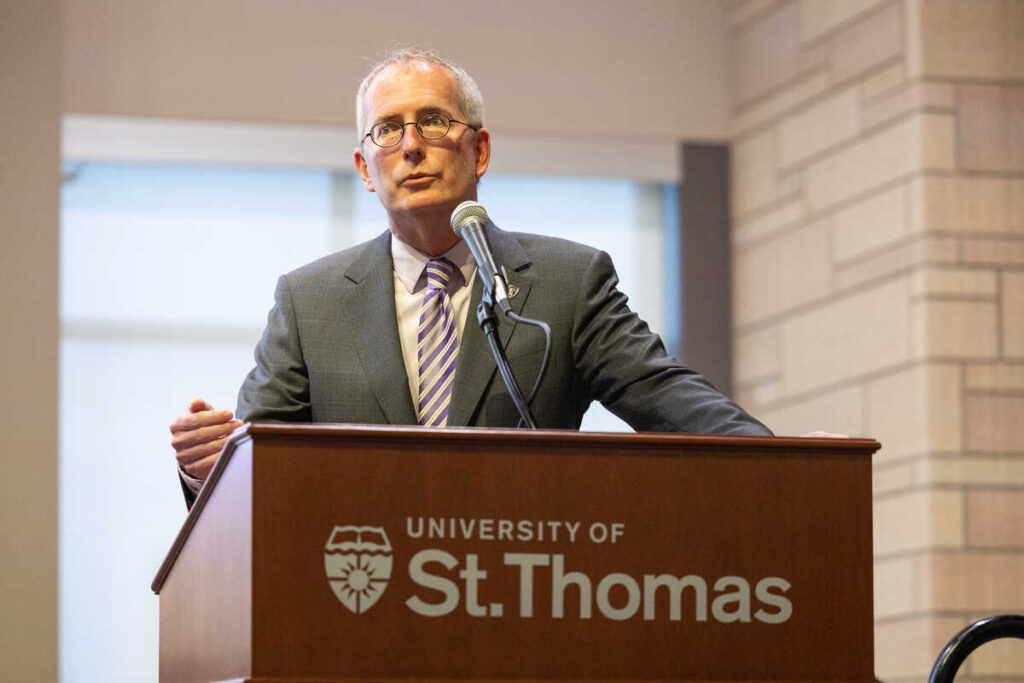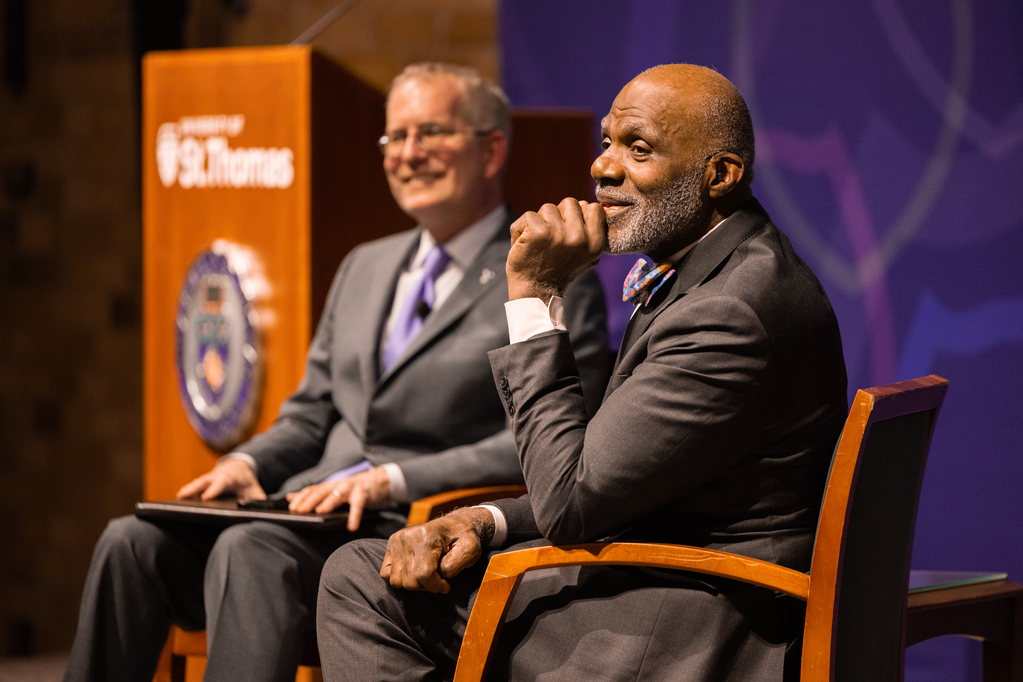An election will be held by mail ballot in early July to determine if a union will represent St. Thomas adjunct faculty members who teach undergraduate-level courses.
The National Labor Relations Board (NLRB) has confirmed that the required number (a minimum of 30 percent) of about 300 St. Thomas adjunct faculty members who teach undergraduate-level courses have shown interest in an election on the option of union representation.
The NLRB will mail ballots to eligible voters on July 3, and the board must receive the ballots by 4:30 p.m. July 18. The question on the ballot will be: “Do you wish to be represented for purposes of collective bargaining by SEIU Local 284?”
The ballots will be counted on July 21. The majority of votes cast will determine if Service Employees International Union (SEIU) Local 284, which last month filed the petition for a union representation election among an SEIU-selected unit of adjunct faculty, will represent them.
St. Thomas President Julie Sullivan, in an email message on May 30, said the university respects the right of adjunct faculty “to make a free choice about union representation.” She urged them to fully inform themselves about the issues and to vote “so their views and interests are reflected in the outcome.”
The university encourages eligible adjunct faculty to ensure they receive a ballot on a timely basis by confirming the accuracy of their contact information, including home address and email address if they prefer a non-UST email, through the Murphy online system.
Adjunct faculty around the country have been participating in NLRB elections on whether to be represented by SEIU. Their concerns include compensation and working conditions, according to national and regional media reports. Adjunct faculty at Hamline University began voting last week on whether to unionize, and an election at Macalester College was called off June 2 to allow more time for discussion.
St. Thomas’ position
St. Thomas today launched a new website to address questions and concerns about the union election. The site includes information about voter eligibility and means of voting, as well as frequently asked questions and a statement titled, “Our Perspective.”
“St. Thomas values our adjunct faculty,” the statement begins, “and is committed to enhancing their work environment and satisfaction. We disagree that union representation is an effective way to achieve this.”
The statement also says that the university’s perspective on adjunct unionization “is not driven by concerns about cost. It is driven by our understanding that the quality of our faculty and our ability to work with them flexibly and creatively are the most critical factors in delivering a high-quality education to our students.”
The election of a union could curtail St. Thomas’ latitude to engage the best-qualified adjunct for a particular position, the statement says. Certain adjuncts, particularly those who work primarily outside of higher education and teach because they want to share their professional expertise, may not be willing to pay union dues or agency fees.
“Our Perspective” also expresses concern that union contracts can be rigid and inflexible and not facilitate innovation or nuanced solutions to issues that can be addressed more effectively by the university in direct collaboration with adjuncts.
“President Sullivan and her administration are committed to continuing to work cooperatively towards the timely resolution of adjunct faculty concerns, consistent with our goal to become ‘one university’ founded on principles of mutual trust, respect and empathy,” the statement says. This work also would be “consistent with our obligation to steward resources in the best interests of our students and the university as a whole.”
The website lists several steps the university already has taken under Sullivan’s leadership to address adjunct faculty concerns. The website includes links to union contracts between SEIU and other universities. These contracts show that adjunct faculty at St. Thomas are receiving higher pay than the rates negotiated by SEIU at other institutions.
Who is eligible?
In its election petition, the SEIU sought to represent all part-time, nontenured and nontenure-track faculty who teach undergraduate courses at St. Thomas, excluding adjuncts who exclusively teach music lessons or graduate-level courses.
Adjunct faculty will be eligible to vote if they taught during the fall 2013 semester, January 2014 Term or spring 2014 semester or were contracted by June 6 to teach in the June or July 2014 summer sessions. The eligible voting group numbers about 300 and includes all part-time, nontenured and nontenure-track faculty who teach undergraduate credit courses or labs on the St. Paul and Minneapolis campuses, and are identified as adjunct faculty, senior adjuncts, participating adjuncts, supporting adjuncts and adjuncts.
Excluded from voting in the election are all other individuals, including:
• Tenured and tenure-track faculty, full-time faculty, clinical faculty, limited-term faculty, distinguished-service faculty, visiting faculty and visiting scholars.
• Faculty who exclusively teach nondegree or noncredit-earning courses, online courses and graduate-level courses.
• Faculty who exclusively teach music lessons.
• Faculty who exclusively teach a course or lab not conducted primarily at the university’s Minneapolis or St. Paul campuses.
• Faculty who are concurrently employed as full-time, tenured or tenure-track faculty by another higher education institution and by St. Thomas with respect to a joint program offered by the two institutions.
• All graduate assistants, teaching assistants, deans, associate deans, assistant deans, department chairs, divisional representatives, program chairs, directors, associate directors, administrators, managers, supervisors, coordinators, coaches, librarians, specialists, guards and all other employees, regardless of whether they have teaching responsibilities.





